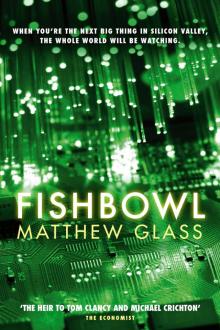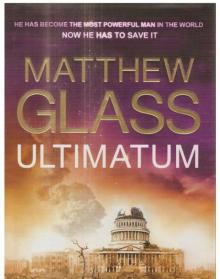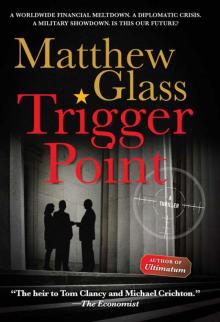- Home
- Matthew Glass
Ultimatum Page 10
Ultimatum Read online
Page 10
“Ideally,” said Olsen, “I’d like the flexibility we’ll get from dealing with this covertly in the first instance. That leaves going public with it as an instrument in our hands, and we can use it when we feel it will provide the kind of pressure we need. But they’ll be watching what you say. Whether or not you cover it in the inaugural will send an important message.”
“What will it say if I do?”
“You’re upping the ante.”
“And if I don’t?”
“You’re frightened of something.”
“Or he just doesn’t know yet,” said Ball. “They might interpret it like that.”
“True,” conceded Olsen.
“What will make them feel more comfortable?” said Eales.
“If we keep it quiet,” replied Olsen. “But do we want them to feel comfortable? I’m not sure. At this stage, probably we do.”
“Of course we do,” said Ball.
“But not for too long. Senator, you’re the new boy on the block. You don’t want them to think you’re a pushover. That means if you keep quiet on this, you’ve got to take action somewhere else. You take early action somewhere else so you’re sending them a second message that you’re not frightened in principle to take action, you’re just waiting for the right moment.”
“Where do you suggest?”
“I’m not sure. Something limited, not particularly important strategically. Off the top of my head, I’m thinking maybe Haiti. We’ve been threatening the Corot regime for years to clean up their act or we’ll intervene. They’ve got an election coming up January twenty-fifth. It’ll be rigged. We could act.”
“Senator,” said Ball, “I’m not sure that action so early in you presidency would set the tone you’re trying to achieve, either at home or abroad.”
“I’ll lay out some options,” said Olsen. “It doesn’t have to be Haiti.”
“It doesn’t have to be anything.”
Benton thought for a moment. “Give me the options, Larry. Now, let’s think about talking with China. If it’s in Kyoto, it’s part of Kyoto. But if it’s bilateral, what do we say to them?”
“Depends on what you’ve done at the inaugural,” replied Olsen. “If you’ve announced it, we have to be hard. We need a proposal. We also have to have a bottom line. You have to get success. Once it’s public, you’re hostage to it.”
“We have to get success anyway,” said Eales.
“That’s true,” said Benton. “Making it public might be a good forcing mechanism.”
“Once you make it public, you can never take it back,” said Olsen. “I want to hold on to that as a weapon.”
“It’s a weapon against us as well,” remarked Ball.
“Granted. We have to bear that in mind.”
“So what if I don’t mention it in the inaugural?” asked Benton.
Olsen shrugged. “You can be softer. As I said, you then use the threat of going public as a way of building pressure.”
“Alan?”
“I agree. But I’m still not comfortable with this whole line of going outside Kyoto. I’ve never heard us say that before. Where’s this coming from?”
“When we start talking to them, we can’t reward them for stringing Gartner along,” said Olsen, ignoring Ball’s question. “We start right back from square one, we don’t concede anything Gartner might have offered. And whatever we do, we move them quickly. We can’t let them get comfortable.”
“Hold up!” Ball wasn’t going to let Larry Olsen talk them into action they’d regret. “Let’s just hold up here for a second. China’s a serious military power. Let’s think about what we’re saying. There’s absolutely no need for us to go backing them into a corner. We’ve got four years to solve this, it doesn’t have to be done in a day.”
“Four years in which the situation gets worse,” said Hoffman.
“I’m with Ben,” said the Senator. “If we allow ourselves to think we’ve got four years, we never get it done. Time’s critical.”
“I didn’t say it wasn’t.”
“Actually, I’m not talking about time,” said Olsen. “I’m talking about comfort. Senator, in my opinion, if you let them get comfortable, we’ve lost it. They have to believe you’re going to act. Otherwise they will lie, and when you discover they’ve lied, they’ll take you down the same process again and they’ll lie again. I’ve seen it.”
“They’ve seen it as well,” retorted Ball. “From us. We’ve done plenty of lying of our own when it comes to emissions control. We need to build trust. And whatever you say, that’s going to take time.”
“No,” said Olsen. “It’s not going to take time. We don’t have the time. So they’re just going to have to see that we don’t lie. That we take action. We’re going to show them, very clearly, and very early. But we cannot let them get comfortable. We cannot let them think they’ve got our number. Senator, that’s the most important thing.”
Alan Ball took some papers out of his briefcase. “Here’s a copy of a speech President Wen made on New Year’s Day.”
Olsen rolled his eyes.
“Senator, just look at the speech. I’ve circled the part of interest.” Ball handed him a copy. He handed others out around the table. “He’s saying they’re committed to the Kyoto process.”
“He’s not saying that, Alan. You’re not the only one who saw that speech. He’s saying they’ll work with their international partners of goodwill. You know that phrase?” Olsen said it in Mandarin. “We’ve heard it from Wen ever since he became president.”
“Senator, he’s sending you a very clear message. Why else would he say that at this time?”
“He’s sentimental. Wen gets sentimental on New Year’s.”
“Larry, come on!”
“It’s true, it’s his daughter’s birthday. January first he gets sentimental, and January second he orders the troops into Hong Kong. Anyone who knows Wen knows that.”
“Senator, read the rest of the passage,” implored Ball. “He says he wants all world leaders to know China’s good intentions, those who are new leaders and those who are old. That’s you, Senator, the leaders who are new.”
Benton read. It was feel-good, internationalist stuff. “Doesn’t look very specific.”
“It’s not so much about the content,” said Ball. “It’s the timing.”
“Alan,” said Olsen, “it’s New Year’s. Wen always makes a speech for international consumption on New Year’s and he always says the same thing. The Chinese media hardly even report it. You want to hear what he’s saying to his Chinese audience, you listen to the speech he makes on Chinese New Year. More importantly, see how the domestic media cover it. That’ll get you a lot closer to his thinking than this will.”
“He didn’t have to include the reference to the new leaders. That’s significant.”
“Right. If it’s significant it just means he’s trying to snow us. All the more reason to go hard.”
“If that’s all you want to do, Larry, just say so!”
“All right,” said Benton sharply. “Let’s cool it.” He looked at both men impatiently. Half an hour at the same table and they were acting like two kids in the school yard. He put the copy of the speech to one side. “Alan, this is helpful. I’ll study it later.” He paused, and looked meaningfully at each of the two men again. “All right, here’s the thing I don’t understand. Why didn’t they want a deal? Gartner was desperate and they must have know it. Logic says, do the deal a week before the election. And on the other hand, if they want to do it in a multilateral context, why were they even talking to us? Why didn’t they leak what Gartner was telling them and drag it out into the open? Either way, China’s going to be hurt by all this as much as we are. They should have done a deal.”
“Senator, with respect,” said Olsen, “who’s they?”
“The Chinese government.” Benton paused. From the way Olsen was looking at him, he felt there was something wrong with the answer.
“Don’t assume everyone in the Chinese government who you think should know about this, does know about it. And don’t assume people who shouldn’t know, don’t.”
“But President Wen must know.”
“If it’s Chen Liangming they were talking to, you can assume so. Chen’s Wen’s man.”
“So why doesn’t President Wen want a deal?” said Benton.
“Who said he doesn’t?”
“Why didn’t he do one?”
Olsen nodded. He was looking at Benton in the same way as before. “We need to educate you, sir.”
Joe Benton let that go. “All right,” he said. “Here’s what I want. I need to know the range of proposals for emissions reduction that we can realistically be looking at. Gartner proposed eighteen percent. Is that too high? Too low? Just right? Jackie, will you lead on that? For the moment a ballpark estimate is fine. John will get you the data and the scenarios from the ESU. Jackie, tell the guys on your team ... I don’t know, give them a bunch of other stuff to do and say we’re looking at a whole range of scenarios.”
Rubin nodded. “I know what to do.”
“We can still go Kyoto, I’m not ruling that out. Alan, we already have your paper on that.”
“I want to expand it.”
“Good. Go ahead. But I also want a bilateral negotiation road map. Larry? I want to know our strategies for dealing with various responses. And yes, give me the options for some kind of action in case we need to make the Chinese take us a little more seriously. But limited action, Larry. I’m not talking about putting an army in the Congo.”
“In the what?” said Alan Ball.
“All right?” said Benton. “Everyone okay with that?”
There was silence. Olsen glanced at Ball. Ball’s gaze was cold.
“Let’s meet in a week. Ben, can you take the minutes here from now on?”
Hoffman nodded. He had been taking notes anyway.
“One more thing, Senator.”
Benton looked at Olsen.
“I need to get you together with some guys on the China desk.”
~ * ~
After they had gone, the senator came into Ben Hoffman’s office and closed the door.
“I’m glad you stopped by,” said Hoffman. “You’ll be pleased to know that as of today you’re scheduled to make an appearance at eight balls on Inauguration Night.”
“Excellent,” said the senator. “Good to know you’re keeping your eye on the things that really matter.”
Hoffman laughed.
“Well?” said the senator. “What did you think just now?”
Hoffman nodded. “I’ve got to say, it was quite a bombshell.”
“I’m sorry I couldn’t tell you. I probably should have got you involved earlier.”
“And you haven’t told Angela?”
“Not yet. I need her out there selling New Foundation.”
“What’s going to happen with that?”
“That’s what I want to talk to you about.”
The senator sat at the meeting table in Hoffman’s office.
“What I’m thinking is that I’m going to use the momentum of my first year to drive as far as we can on the legislation for the critical elements we need to put in place. Universal health. Education. Job creation. That’s the framework for Relocation. If we can put the framework in place, if we can establish the elements of fairness, then we can expand on that, but if we don’t have the framework in place and this thing blows up, I don’t think we ever get it. I’ve talked it through with John. I just can’t see that we’re going to be able to sell a whole bigger package from the start.”
Hoffman considered it.
“I want you to think about it, Ben. Set up a time with John and me and we can have a discussion.”
Hoffman nodded. “Whose side are you on, by the way? Alan or Larry’s?”
“I didn’t know there were sides.”
“No?”
Benton shrugged. “You know, I was as surprised as anyone that I appointed Larry. But he was cogent. And he made me see something in a way I hadn’t seen it before. When that happens, I value it.” He paused. “Ben, I’m not saying I like his style. But we can’t afford groupthink. That’ll kill us. We need a few subversives. If Al Graham had been in that room today instead of Larry, we just wouldn’t have had the same debate. We have to be prepared to test our thinking. That’s true generally, but if there’s any one specific issue we really need to do it on, it’s this.”
“Well, having Alan and Larry in the same room will certainly make for better entertainment, that’s one thing.”
“Creative friction,” said Benton. “Who was it who had the theory it’s the source of all great achievement?”
“I have no idea, but we should invite him to our next meeting.”
The senator laughed.
“How did Al take it, by the way, getting the UN?”
“You haven’t spoken to him?”
Hoffman shook his head. “He probably thinks I schemed against him.”
“Well, he took it,” said Benton. “It wasn’t pretty. He acted like he was offended. In fact, at first he told me he wouldn’t do it. Turned me down flat.”
“And then?”
Benton shrugged. “I told him he’d always have a line to me.”
“And that did it?”
“Who knows? Al wants to be back in the game, right? The UN’s a pretty good stage.”
“Sure.” Hoffman thought for a moment. Then he smiled.
“What?” said the Senator.
“I just wonder whether you like being told you need to be educated.”
~ * ~
Thursday, January 6
Logan Circle, Washington, D.C.
“What the hell is this place?”
Larry Olsen grinned. “It’s an apartment I’m using until I get set up in D.C. again. Belongs to my brother-in-law. Come in.”
The senator took a couple of steps inside. He looked around. The place was a shambles.
“Come through,” said Olsen.
Three people were waiting in the living room. They stood as Benton came in.
“Dr. Elisabeth Dean,” said Olsen. “The undersecretary of state for China. Dr. Oliver Wu, one of the China experts at State. And this is Sandy Chan, the Beijing station controller over at the Agency. Technically, I shouldn’t have invited her to this meeting.”
“Technically, I shouldn’t have accepted,” said Chan, putting her hand out. “An honor to meet you, sir.”
He shook hands with them. They all seemed so young.
“Sit down, Senator,” said Olsen. “Scotch? Don’t have much else, I’m afraid. You take it neat, as I remember.”
“Thanks.”
Olsen poured him a scotch.
“We haven’t talked about any one specific thing leading up to this meeting, Senator,” said Olsen meaningfully. “I’ve just told the guys you want a general briefing about the state of play in China.”
“Thank you,” said Benton. “That would be very helpful.”
“We’re going to have freewheeling discussion.” Olsen sat down. “Elisabeth, would you lead?”
“Certainly.” Dr. Dean paused for a moment, then began. “Senator Benton, we think China today is pretty much in the same kind of situation it was back in 2013. If you remember, the economy had been growing steadily for about thirty years straight at that point. Politically, the party had achieved a kind of precarious balance. From an external perspective, the nature of the regime and its domestic actions were rarely critiqued to any serious extent by other governments. There was a kind of unspoken agreement by which foreign governments turned a blind eye to the way the party maintained power—paying lip service to concerns over human rights but never doing anything about it-—in return for access to China’s markets and its low-cost manufactures. Domestically, the legitimacy of the regime depended on another trade-off—as long as the regime delivered growth and political stability, the mid
dle classes focused on doing business and accepted its rule. But it was a precarious balance. The economy was overheated, with inflation continuously threatening to get out of control. There were numerous social tensions that the regime struggled to contain, in particular an extreme disparity in wealth between the cities and the countryside. And within the urban middle classes, which were growing exponentially, increasing demands for democracy clashed with the objective of the party to stay in power and of individuals in the party and the army to keep feeding on the endemic corruption in the state. These tensions had been strong for at least a decade. The global slowdown created by the credit crisis of2008 and 2009 greatly exacerbated them, despite the Beijing Olympics of 2008, which the party used to stoke nationalist support for the regime and clamp down on dissent. After that, the problems were at breaking point, just waiting for a trigger.”

 Fishbowl
Fishbowl End Game
End Game Ultimatum
Ultimatum Trigger Point
Trigger Point